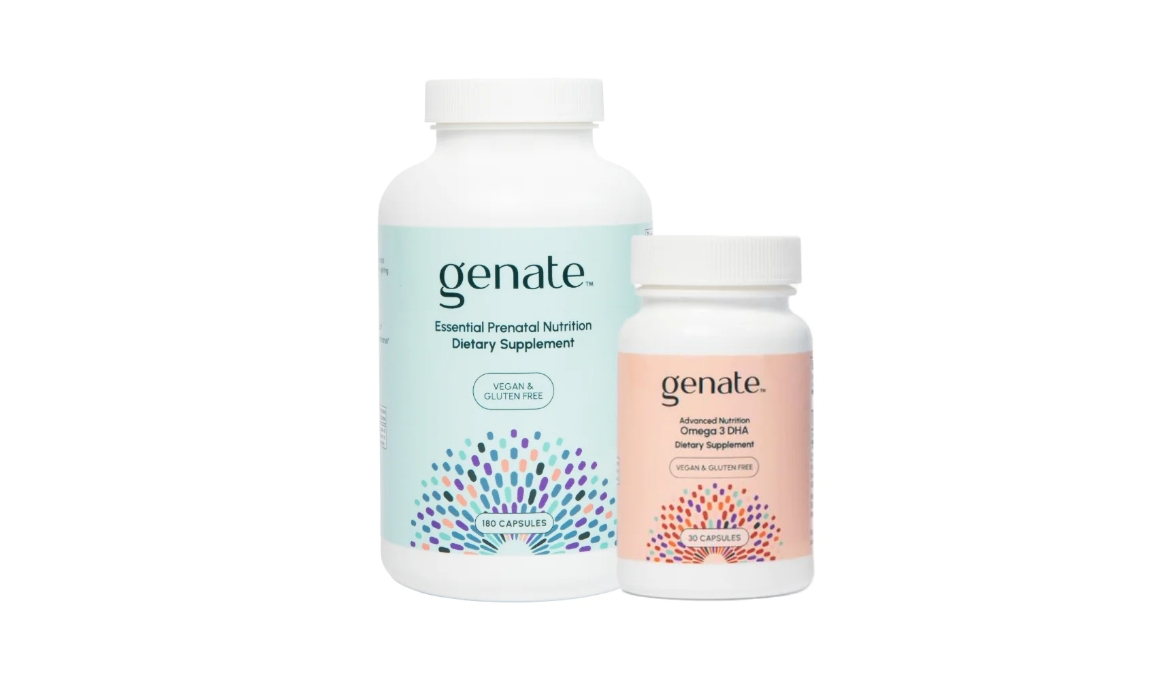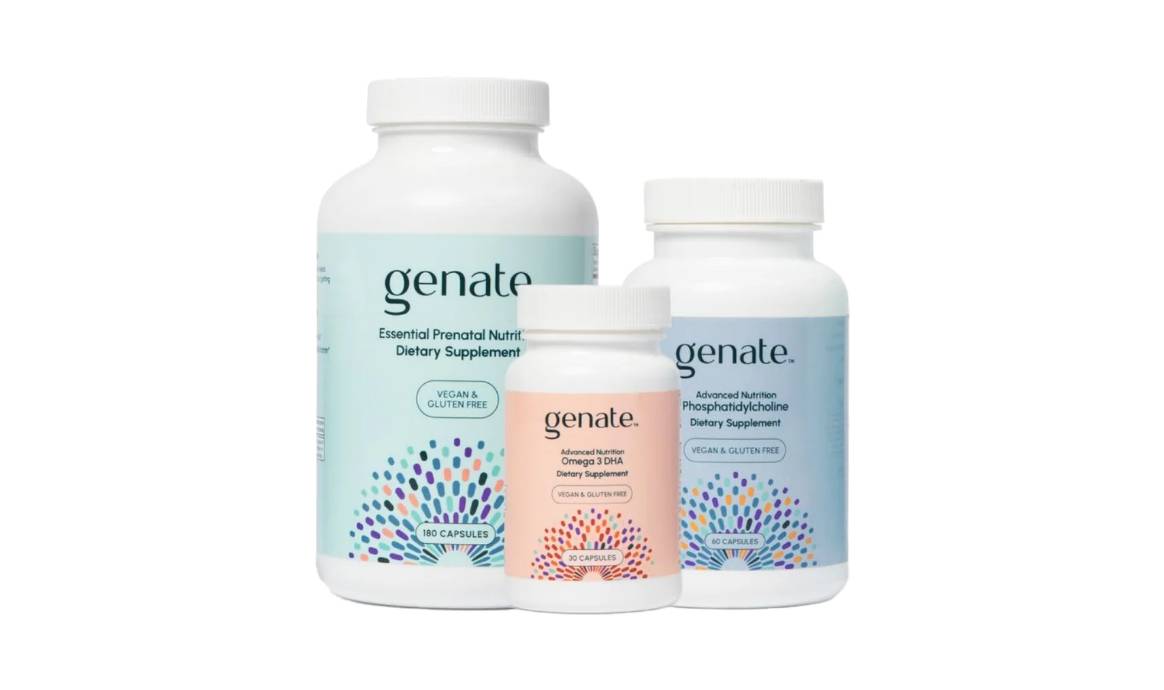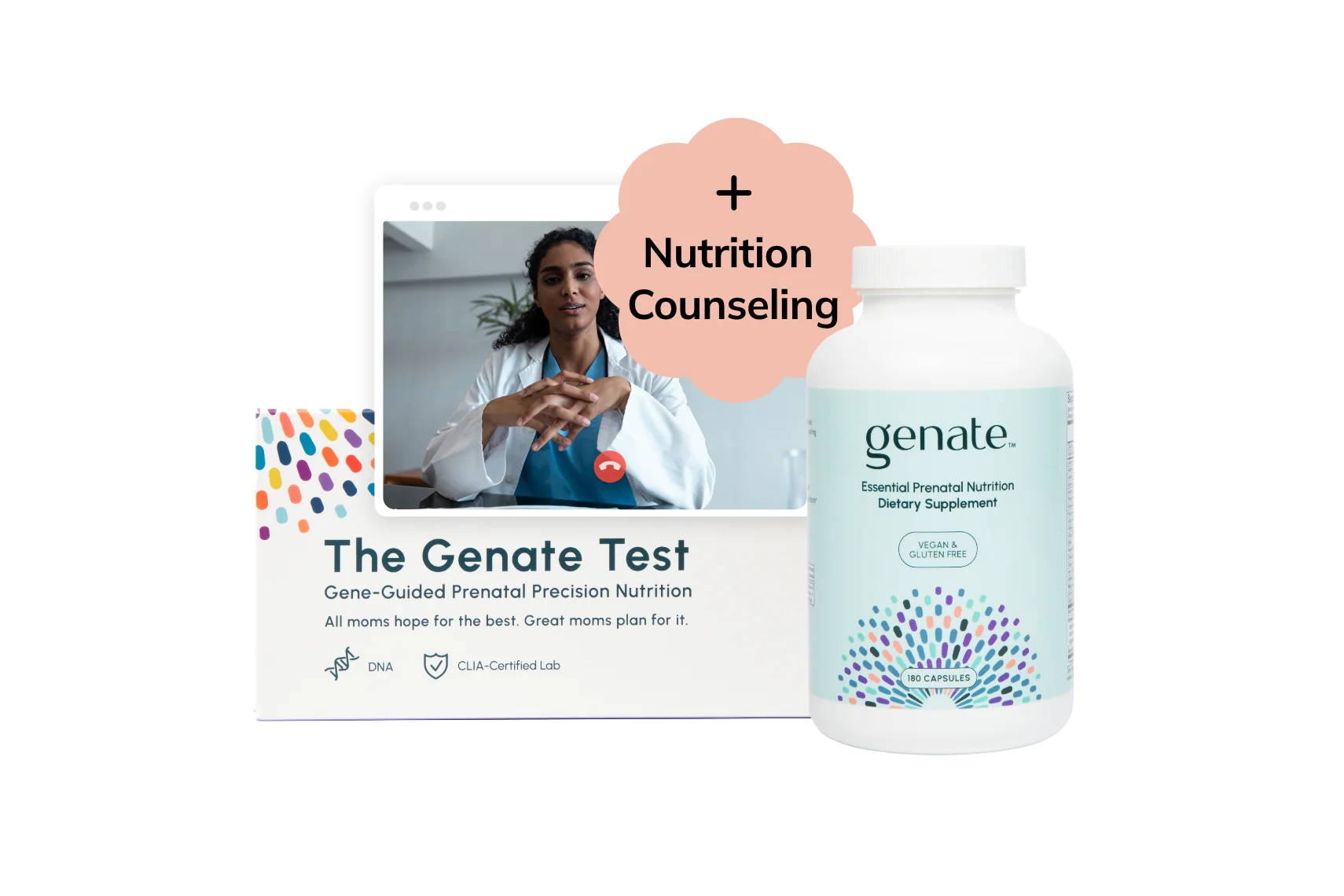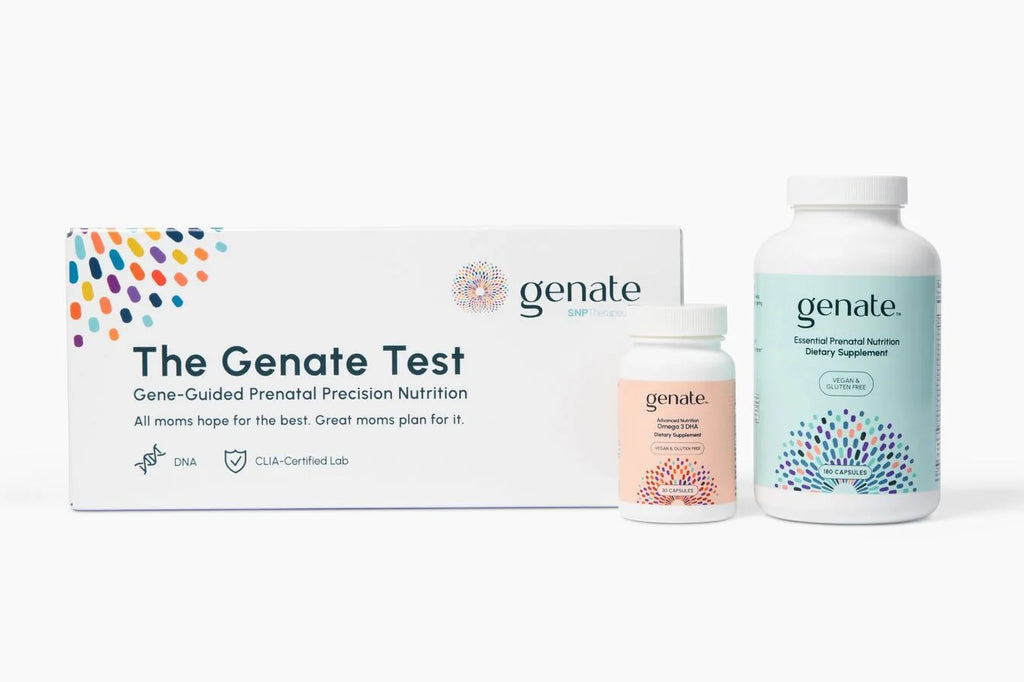An example of nutrigenetics is lactose intolerance, where an individual is unable to digest lactose, the natural sugar found in milk. This condition occurs because people with lactose intolerance lack the gene responsible for producing lactase, the enzyme in the small intestine that breaks down lactose.

DIET & NUTRITION
What to Expect at Your Nutrigenetics Counseling Session
by Cara Everett, MS, RDN, LD • August 8, 2024 • 6-8 minute read
Nutrigenetics is an evolving field that combines the science of nutrition and genetics, helping us understand the impact our genes have on the way our body processes nutrients. A pregnancy nutritionist/dietitian trained in nutrigenetics can help you understand the results of your Genate Test and make diet changes for improved health based on your genetic signature.
Optimal nutrition can make all the difference as you plan for a healthy pregnancy. Whether you're trying to conceive, are facing issues with fertility, are currently pregnant, or you're breastfeeding, nutrition counseling by our registered dietitians can get you on the right track. After you purchase a counseling session with a focus on nutrigenetics, we will send you a link to schedule an appointment with one of our dietitians.
Let’s take a look at what you can expect from your first nutrigenetics counseling session, how to get the most out of it, and some questions you may want to ask your dietitian.
How to Prepare for Your Nutrigenetics Appointment
Before your first nutrigenetics session, you will receive a comprehensive intake form. It will ask a number of questions about your general health, your family and personal medical history, medications and supplements, your current diet intake, and what you hope to gain from nutrition counseling.
Try to be as thorough as possible in your answers, as this helps the dietitian get a complete picture of where you are currently on your health journey and where you’d like to go with your nutrition goals.
Discover the genetics that affect your baby's cognitive development
Nutrigenetic Session Details
Every (RD or RDN) has the training and education necessary to provide nutrition guidance for overall health and a wide range of health conditions. But some dietitians have specialized training in certain areas associated with nutrition for pregnant women. For example, Genate dietitians specialize in nutrigenetics and pregnancy. These experts combined with our genetic tests allows us to give you insightful, one-of-a-kind counseling.
During your session, the nutrigenetics focused dietitian will conduct a comprehensive nutrition assessment, taking into account your medical history, nutrition needs, health goals, and personal preferences. They will then create an individualized diet plan for you with action steps to help you implement changes. Follow-up appointments are also available to review your progress and address any concerns.
Initial pregnancy nutrition sessions typically last about an hour and include a nutrition history, assessment of your needs and current state of health, and development of a plan to make positive diet changes for improved health.
Your first nutrigenetics session will look similar, with a few key differences. Your dietitian will do the following as part of your appointment:
- Take a complete medical and nutrition history
- Assess your current diet
- Discuss your needs and preferences regarding food and supplements
- Walk you through the results of your Genate Test, including any partial or complete SNPs (genetic misspellings) you have in nutrient pathways
- Point out any increased nutrient needs based on your genetic makeup
- Review your recommended daily intake levels of each nutrient
- Develop a diet plan and specific recommendations to help you implement changes to your diet and/or supplement regimen
Nutrigenetics Test Results
It can feel a bit overwhelming to get your test results and learn of genetic misspellings that may be impacting your health and that of your baby. But remember that you’re not alone: it appears that genetic mistakes may be quite common in nutrient pathways. For instance, almost 75% of women in one study had a misspelling in their PEMT gene, resulting in less production of the active form of choline.
If your genetic test reveals one or more SNPs, it’s important to view that information as a powerful tool you can use to make changes in your diet for improvements in your and your baby’s health. By working with your dietitian to increase your intake of specific nutrients, and utilizing supplements if needed, you can give your baby the best start in life while protecting your health at the same time.
Essential Nutrients in One-Carbon Metabolism
Key nutrients involved in one-carbon metabolism, such as folate, choline, betaine, vitamin B12, and B6, are crucial for fertility,including fetal and newborn development. One-carbon nutrients are necessary for DNA methylation and brain development. Genetic variations in enzymes and carrier proteins associated with one-carbon metabolism can affect perinatal nutrient requirements for women.
One carbon metabolism is commonly understood to include folate and B12 and their role to support methylation and reduce neural tube defects. Other one-carbon nutrients such as choline support the methylation process via its oxidized form Betaine, while also supporting cellular membrane development and neural stem cell proliferation and apoptosis to support brain structure and function.
Nutritional Genomics
Nutritional genomics focuses on the interaction between bioactive food components and the genome. It includes the study of how nutrients influence gene expression and how genetic variations affect nutrient metabolism and health outcomes.
Nutrigenetic counseling services can help women understand the way their genetics play a role in maximizing pregnancy outcomes and help them make informed decisions regarding diet to support their unique needs.
By understanding important functional variants in critical metabolic pathways, women can take action to address potential nutritional deficiencies.
Genate Dietitians help women interpret one carbon nutrient genetic testing and craft a plan to support their healthy pregnancies to better address gene expression in their developing fetus or newborn.
The following interdependent pathways addressed in the Genate Test include:
1. Folate Cycle
2. Methylation
3. Choline Metabolism
4. Phosphatidylcholine Synthesis
5. Fatty Acid Transport
Why You Should Trust Genate’s Test & Pregnancy Nutritionist
It’s important to learn from a dietitian who is experienced in both nutrition and genetics to explain the results of your Genate Test. This test examines the functional genes responsible for helping your body metabolize a variety of nutrients that are critical for your health in pregnancy and your baby’s brain and nervous system development. SNP Therapeutics dietitians combine their knowledge and expertise in the areas of clinical nutrition and genetics to give you a comprehensive view of how your genetic makeup may be affecting your nutrient needs.
Our dietitians can serve as a comprehensive resource and a valuable member of your healthcare team. In developing your nutrition care plan, our dietitians take a holistic approach that incorporates your:
- Calorie needs for healthy pregnancy weight gain and postpartum weight management
- Other nutrition-related health issues, including (but not limited to) Type 1, Type 2, or gestational diabetes, hypertension, obesity, hypo-or hyperthyroidism, iron deficiency anemia, and hyperemesis gravidarum
Overall, our dietitians are committed to serving as a resource for you and your healthcare team before, during, and after pregnancy. They will communicate nutrition care plans as needed to referring providers and other healthcare professionals as part of an interdisciplinary approach, guiding you toward the goal of achieving optimal nutrition for you and your baby.
“Nutri-genetic counseling services can help women who have heterozygous mutations in critical pathways find ways to address the roadblock with different nutritional sources or supplements.” - Steven Zeisel MD, PhD.
What Happens After Your Nutrigenetics Session?
Following your appointment, the pregnancy nutritionist/dietitian will create a document with your personalized recommendations and a master diet plan to refer to when grocery shopping and scheduling meals for the week. It may take time to get used to eating a different way, especially if there are a number of new foods to add to your regular diet.
Be patient with yourself, and remember that you can text, email, or call your dietitian at any time with questions or concerns. You also have the option to schedule a follow-up appointment or a series of appointments.
Specific supplements may be indicated depending on your genetic profile can benefit individuals who don't eat fish or have specific dietary restrictions. Always consult with your healthcare provider beforehand for personalized recommendations on dosage and brand. Learn more about nutrition to feel prepared for your nutrigenetics counseling session.
Take the nutrition quiz to see how Genate can help tailor your prenatal nutrition to your unique genetic signature.
This article is not intended as medical advice to treat or diagnose any health condition but rather as educational health information for the general public. It should not be used as a substitute for individualized medical care from your healthcare provider.
Shop the Article
Save 23% today!
Genate Essential Prenatal Multivitamin + Advanced Omega-3 DHA Package
Bundle to increase savings and provide the foundational nutrients needed for optimal health and development.
From $72 per month
Save 23% today!
Comprehensive Prenatal Support Package
Genate Essential Prenatal Multivitamin + Advanced Omega-3 DHA + Phosphatidylcholine
Our most comprehensive bundle - you’ll receive our Essential Prenatal Multivitamin, Advanced Phosphatidylcholine, and Advanced Omega-3 DHA.
From $110 per month
Save 30% today!
Comprehensive Prenatal Nutrition Bundle
Buy the Genate Test and a nutrition counseling session with a Genate registered dietitian, and receive a 30-day supply of the Genate Essential Prenatal Multivitamin FREE. Purchase includes a 90-day prenatal multivitamin subscription at our best monthly price.
$309

Cara Everett, MS, RDN, LDN
Cara is a registered dietitian nutritionist with a passion for helping people optimize their health with sustainable diet and lifestyle changes. She provides nutrition counseling to clients of all ages, with specialties in nutrigenetics, women's health, and chronic medical conditions.
Cara is also a health writer and editor with over 20 years of experience creating content for print and digital media outlets, nutrition and wellness blogs, and medical white papers. Her work has been featured on websites such as the National Council on Aging, Everyday Health, HelpGuide, MarketWatch, and Verywell. Cara's current writing covers women's nutrition and nutrigenetics in pregnancy and lactation.
As lead dietitian for SNP Therapeutics, Cara shapes content strategy, medically reviews and edits articles, and provides gene-focused medical nutrition therapy for clients. She holds Bachelor of Science and Master of Science degrees in Nutrition from Texas A&M University and completed her dietetic internship at the University of Kentucky Hospital.
References
https://www.eatright.org/about-rdns-and-ndtrs
https://www.ncbi.nlm.nih.gov/pmc/articles/PMC3481686/
https://www.ncbi.nlm.nih.gov/pmc/articles/PMC1574369/
Take the Genate Quiz
Take our Nutrition Quiz to learn more about your nutrition journey.
Read Our Latest Articles
Frequently Asked Questions
What is an example of nutrigenetics?
What is the difference between nutrigenomics and nutrigenetics?
Nutrigenomics explores how dietary components interact with the genome, influencing changes in proteins and metabolism. Nutrigenetics, on the other hand, focuses on how genetic differences shape individual responses to dietary components.
What are the benefits of nutrigenetics counseling?
Nutrigenetics counseling offers personalized nutrition plans based on an individual's genetic makeup, leading to better health outcomes and more effective management of conditions like obesity and diabetes. It also helps optimize nutrient absorption and reduce the risk of food intolerances or allergies by identifying potential adverse reactions to certain foods.








